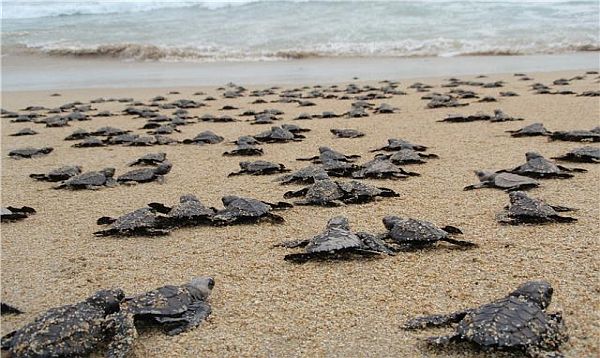Costa Alegre, Jalisco, Mexico - In late July or early August, sea turtle spawning season will begin in Jalisco's Costa Alegre, so academics and researchers from the Department of Education for Sustainable Development of the Coastal Environment of the University of Guadalajara, based in Melaque, are preparing to meet, or even exceed, the achievements made during the 2014 season.
Last season 5680 nests were protected: 5000 in the La Gloria turtle camp, 100 nests at the Tenacatita Beach Hotel in the municipality of La Huerta; 80 in Barra de Navidad, and 500 nests on Coco Beach, explained camp director Maestro Jose Antonio Trejo Robles.
 |
The work of turtle conservation and rescue requires simple equipment, but it deteriorates easily due to proximity with sea salt, water and breezes, not to mention the beaches' gullies and rugged ground.
"It is common to have damage to the ATVs we use for surveillance, as they get a lot of wear and tear from being in contact with sand for long periods of time. The patrols run from 21:00 to 8:00, and sometimes the gullies are flooded, so generally they last no more than four or five years," he explained.
In recent years, the University Center of the South Coast (CUCSUR) sea turtle protection program has been working with hotels, restaurants, fishing cooperatives and the general public in Costa Alegre beach communities to increase the area of protection and offer environmental education activities for children and adults.
During the next six months the academics will return to work at both the La Gloria turtle camp and the Tenacatita Hotel, as well as in Barra de Navidad and on Coco Beach. In addition to egg rescues and baby turtle releases, they carry out educational activities and research projects involving school students and undergraduates, while monitoring environmental committees and local communities.
Trejo Robles invites all people from all over the country to join in these activities, whether by directly participating in the turtle camps or by making in-kind donations of much-needed items such as stationery for workshops, foodstuffs to feed volunteers, plastic chairs and tables, rain coats, flashlights and batteries, tires and gasoline for the ATVs, and even motorcycles for patrolling.
Those interested can contact Maestro José Antonio Trejo Robles at 01 (315) 355-6330, 01 (315) 355-6331, or email jtrejo(at)jtrejo@costera.melaque.udg.mx.
Translated and edited by Lorena Sonrisas for BanderasNews.com.


